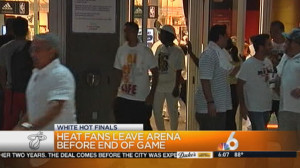Justification - A New Peace
While Jason was sleeping in and laying on the beach in Hampton, VA, and Dennis was rubbing elbows with Virginia Conference Bishop, I held down the fort back in Alexandria. We continued our sermon series 'Justified', as Aldersgate works it's way through Paul's Letter to the Romans. Below is the audio and the text from my sermon on Romans 5:1-11.
This past week the Miami Heat & San Antonio Spurs wrapped up the 2012-2013 NBA season. Whether you are a Heat fan, a Spurs fan, or could care less about the NBA because college basketball is 100 superior and the game played in the NBA allows player basically run up and down the court without dribbling the ball, it was hard to hide from the 24/7 coverage ESPN provided us with. One story in particular stood out from the rest.
On Tuesday night the Heat and Spurs battled in what some have described as one of the all-time greatest NBA playoff games, some would not agree with that statement because college basketball’s superiority over the NBA, but others are saying that it was in fact one of the greatest basketball games (and come backs) ever played.
With less than a minute left in regulation the Miami Heat were down 5 points and many fans began to stream out of the American Airlines arena, disappointed that LeBron James and his teammates had been unable to play the game of basketball at a NBA championship caliber level for 4 quarters in a row.
 Little did these fair-weather fans know, that the Heat would tie up the game with less than a minute to go, send game six into overtime and win by a 3 point margin, 103-100.
Little did these fair-weather fans know, that the Heat would tie up the game with less than a minute to go, send game six into overtime and win by a 3 point margin, 103-100.
The fans that left the game early, those folks who did not want to stick around for the final few seconds of the game were not allowed to re-enter the arena. They were not invested in the team and were, as some sports commentators have argued, “fair-weather fans”.
Those fans that left early had done little more than put on the appearance of being a Miami Heat fan and showed up to the American Airlines area. That was it. They claimed the name of the Miami Heat, a team that until LeBron James and Chris Bosh joined the roster had been at the bottom of the NBA, and showed up. The left the arena, left the game, and were left outside in the dark.
Our scripture reading from Paul’s letter to the Romans that we are focused on this week has Paul moving from the first section of his letter to a section, chapters 5-8, that focus on the powerful love of God that is found in Jesus Christ. Chapter five opens with a discussion on the fruits of justification: peace, grace, hope, and love, and Paul declares that we are now at peace with God, through Jesus Christ. The peace Paul is referring to is not an “inner tranquility” (Witherington, pg. 133) or a healthy harmony that now exists for Christians.
The word Paul uses here is similar to the Greek word dikaiothentes. The peace Paul is referring to is a “restored or fixed relationship” (Witherington, pg. 133) between humanity and God. Paul is talking about a peace that results in reconciliation. “Reconciliation describes what God did in salvation. It indicates a thorough change in relationship.” (Hoyt, pg. 257)
This new peace, our reconciled relationship, also offers us renewed hope for the future. Our renewed hope stands in stark contrast to that fact that “ all have sinned and fall(en) short of the glory of God” (Romans 3:23). This hope for the future is grounded in the love God has shown to us through the Holy Spirit and Jesus Christ, which was made available by Christ’s death for sinners. It is easy enough for us to imagine Christ willing to die for someone who is righteous and “good” but it can be harder to imagine why Christ would want to, let alone actually dying for a sinner.
What Paul is saying is that Christ’s death for the sinner, for us, was not just a good idea or an arbitrary noble cause. Christ’s death for the sinner was an invitation then, and is an invitation to us now, those who gather on Sunday mornings in church, to embody the example of life that Christ gave to us. Christ’s death is about living, and not only about dying.
Christ came to Israel while Israel was weak, and comes to us in the midst of our own weakness. Jesus is not waiting for you to get “right”, but instead is willing to meet us just as we are.
Paul’s writing here is nothing new. Jesus speaks of the same invitation to the kingdom and to salvation for sinners after he tells the chief priests and elders that prostitutes, women who were considered to be the lowest of the low, would make into the kingdom of heaven before anyone who believed themselves to be righteous.
Jesus’s parable of the wedding feast sets up for us the picture of one, who will enter into God’s kingdom, and two, what it will take to enter into the kingdom. Here is what Christ said:
“The kingdom of heaven may be compared to a king who gave a wedding banquet for his son. He sent his slaves to call those who had been invited to the wedding banquet, but they would not come. Again he sent other slaves, saying, ‘Tell those who have been invited: Look, I have prepared my dinner, my oxen and my fat calves have been slaughtered, and everything is ready; come to the wedding banquet.’ But they made light of it and went away, one to his farm, another to his business, while the rest seized his slaves, mistreated them, and killed them.
The king was enraged. He sent his troops, destroyed those murderers, and burned their city. Then he said to his slaves, ‘The wedding is ready, but those invited were not worthy. Go therefore into the main streets, and invite everyone you find to the wedding banquet.’ Those slaves went out into the streets and gathered all whom they found, both good and bad; so the wedding hall was filled with guests.
“But when the king came in to see the guests, he noticed a man there who was not wearing a wedding robe, and he said to him, ‘Friend, how did you get in here without a wedding robe?’ And he was speechless. Then the king said to the attendants, ‘Bind him hand and foot, and throw him into the outer darkness, where there will be weeping and gnashing of teeth.’ 14 For many are called, but few are chosen.”
Here, what we learn is that it is not simply enough to show up for the party. That its not enough to show up for the wedding or to go to the game.
We received our wedding garments, our Miami Heat jersey, at our baptism.
What we learn in this parable is that this is all about God’s kingdom, a kingdom that as Paul tells in verse 11 that we are now reconciled with, and that we can be confident in that reconciliation because of Christ’s life, and not only his death. And that is what grace and peace are all about.
It’s about building God’s kingdom in here and now, grace is about the kingdom that no one wants.
The salvation offered to us through the Holy Spirit and the life of Christ is a arrabon, a down payment of what is to come through God’s reconciled kingdom.
Paul is often quoted as speaking of salvation in the future tense, as in salvation is something that will come. But here, in the fifth chapter of his letter to the Romans, Paul is saying the salvation is available to everyone, especially sinners or those on the outside, because of the way in which Christ lived, not exclusive to way in which Christ died. The grace that has been made available to us in the present is more than a gift.
The grace offered to us through Christ’s life and his death offer us a reunion. Reunion with God yes, but also with one another. A reunion that was not initially possible due our sinful nature. As theologian Stanley Hauerwas puts it, “grace is the reunion of life with life”.
The convent that was created between YHWH and the people of Israel was seen as a marriage bond, and since the covenant had been broken and a separation created. Reestablishment of the covenant/bond was necessary, and was carried about by the work of a Servant, resulting in a new creation.
We were created to be idols of God. God’s most perfect reflection was created in us. The marriage bond that was to exist between YHWH and Israel was suppose to be the way in which we reflected God, but instead we turned that perfect reflection of God, to being reflections ourselves (just like those guests who refused to attend the wedding feast) into our own idols.
Many protestants like to think that the grace and peace offered to us means that we are accepted, which is true. We like to think that we have our grace, which means that we have our salvation, which means that we are good to go when God’s final judgement is made.
However, the wedding garment that we all we given because of our baptism calls us, and requires us, to put it on, not merely hold onto it for a rainy day. Our wedding garment is an invitation to take the peace of God that we have experienced and share it with the grittiness of the world. We are called, because of our baptism and the grace offered to us, into the resurrection and into the life of Jesus.
This life calls for us to be different, to be a people who shine into the world so that the world might know that God’s new kingdom is available in the present. Just like Paul is speaking in this part of his letter to the Romans of salvation and be being available in the present, God’s kingdom is too available here and now.
Justification, in addition to making us right with God on a personal level, justification transforms us into people who do justice. That is what makes us able to refuse to engage in practices that to some make us seem socially or politically disloyal. And when might be seen as disloyal, or we get bogged down by the grittiness that we are engaged with, it is the peace and hope of God that make use able to endure whatever suffering we might experience. Justification enables us to wear our wedding garments, to put on our Heat jersey, and wear them as we engage in the grittiness of the world and not just show up for the party.
Because of the righteousness of Jesus Christ, that is to say Christ’s obedience and faithfulness in His life and His death, we are can now be declared “right” before God and experience the dikaioma, or peace, that God has offered to us as a free gift.
The end game to all of this, is that we get to inherit the age to come, God’s kingdom and share that kingdom with those who are the “fair-weather” fans or who have simply never been invited to the game. Not only are we to be saved and justified before God, through God’s grace and through Jesus Christ, but we are to be the agents of God’s renewed creation.
As Thomas Hoyt puts it, “God has made peace. God has reconciled. God has saved.”
